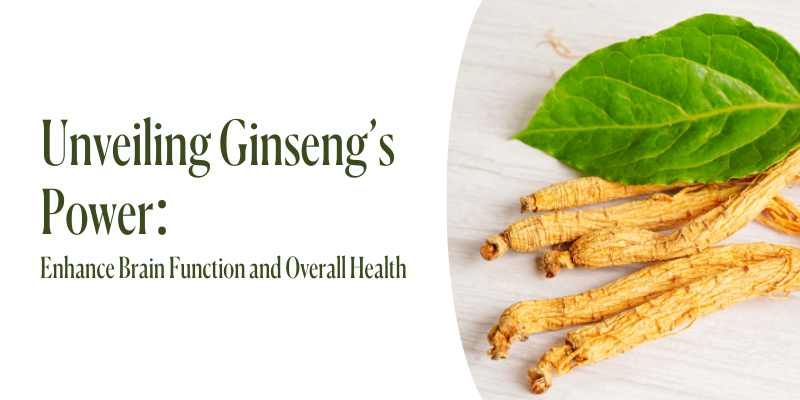Unveiling Ginseng’s Power: Enhance Brain Function and Overall Health
Ginseng is one of the most popular herbal supplements today due to its many health benefits. Studies show that it may promote healthy energy, support the body’s natural stress response, support healthy cholesterol and blood sugar levels already within normal ranges, offer antioxidant support, promote the immune system, and promote longevity. However, recent emerging research shows ginseng is effective in boosting brain function and cognition.
Types of Ginseng and Their History in Herbalism
Many herbs are dubbed "ginseng," such as Siberian ginseng or eleuthero (Eleutherococcus senticosus), known in TCM as Ci Wu Jia. However, the true ginseng belongs to the Araliaceae family and the Panax genus, such as the Asian ginseng (Panax ginseng) and American ginseng (Panax quinquefolius), known in TCM as Ren Shen and Xi Yang Shen respectively.
The fleshy root of the plant is often harvested in autumn, then categorized by age. Roots harvested before four years are called fresh ginseng, between four and six years are white ginseng, and beyond six years are red ginseng. As the root ages, its temperature becomes hotter, and its potency increases, as well as its price. After harvest, ginseng root is processed by drying or steaming prior to being sold for consumption.
Native to China, ginseng (Ren Shen) has been used in Traditional Chinese Medicine for centuries, with written records that date back to 100 A.D. It has a slightly warm temperature, a sweet and slightly bitter taste, and is considered a strong qi tonic for the entire body as it tonifies qi of the Lungs, Kidneys, Spleen, Stomach, and Heart, as well as rescues collapse of yin yang and yuan qi.
The American ginseng (Xi Yang Shen) is native to North America and largely cultivated in Wisconsin, but can also be found in Pennsylvania, New York, and Ontario, Canada. As a TCM herb, it is actually classified as a yin tonic that has the ability to tonify Lung qi. Unlike Ren Shen, its temperature is cool, so it's often used when heat signs are present. It is also a milder tonic with less invigorating effects than Ren Shen.
The Science Behind Ginseng
The distinguishing active components of the Panax genus are ginsenosides, which are natural steroid-like compounds that promote a wide range of health benefits attributed to ginseng. There are over 100 known ginsenosides, the varying presence of which is further used to differentiate between the various species.
Research has shown that ginseng promotes memory in healthy adults as soon as three hours after consumption. A large study involving over 6000 older adults also reported that the long-term usage of ginseng over five years supported their memories. Additionally, ginsenosides elicit adaptogenic benefits of promoting healthy mood by reducing everyday stress and occasional feelings of anxiety. An in vitro study also showed this compound may possess antioxidant properties that support brain cells.
The other major compound found only in Panax ginseng is gintonin, which is not as well-known as ginsenosides. This receptor-binding protein has only recently been identified. Research on gintonin from South Korea between 2018 to 2023 suggests that it targets specific binding sites that affect the migration, proliferation, and growth of various types of cells, especially those of the nervous system. These studies have shown gintonin to have neurosupportive effects in animal models. Additionally, it has shown the ability to promote the growth of neuronal dendrites and permeability of the blood-brain barrier.
How to Use Ginseng in Your Practice
With its vast application and potential health benefits, ginseng is available in many forms to suit the various lifestyles of its users. In China, many people add it to their soup as part of the daily cuisine.
In TCM, it is usually combined with other herbs and decocted into a tea. Similarly, ginseng powdered extract can also be taken in combination with other herbal powders or even encapsulated for modern conveniences. Tinctures can also be made by soaking the root in alcohol to make an aqueous extract with an extended shelf life. Although it can be easily found over-the-counter, it is best to consult your herbal supplier for the best quality.
Natha Surinsuk, born and raised in Thailand, received a B.S. in Psychobiology from the University of California, Los Angeles. Passionate about Eastern Medicine and helping others, Natha went on to complete her Masters of Science in Traditional Oriental Medicine at the Pacific College of Oriental Medicine (now Pacific College of Health and Science). She currently practices in the South Bay area of southern California.
